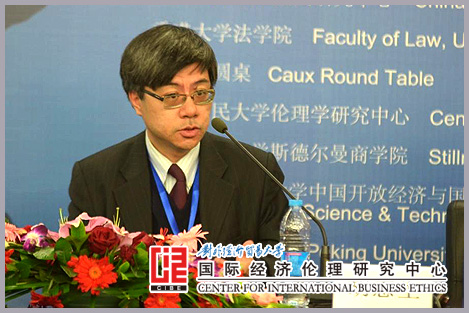What picture will you come up with when a lawyer in Hong Kong is mentioned? A natty suit with glaring shoes, greatful bearings, declaimng on any issues that come to them, standing for justice; or, going by the flow, speculative and exploiting any means to make a win On the second day of the annual meeting of the Cente r for International Business Ethics, Mr. Richard, a lawyer with years of experience and a member of the consulting committee for the international journal, “Legal Ethics,” and his wife, Grace Leung, a visiting scholar from Tsinghua University, presented a vivid address titled: ”Depiction of Lawyers and Lawyer’s Image and Ethics in Films and Television Drama”. r for International Business Ethics, Mr. Richard, a lawyer with years of experience and a member of the consulting committee for the international journal, “Legal Ethics,” and his wife, Grace Leung, a visiting scholar from Tsinghua University, presented a vivid address titled: ”Depiction of Lawyers and Lawyer’s Image and Ethics in Films and Television Drama”.
Mr. Richard first introduced his and his wife’s current research on this topic, and then opened two points for their discussion. First, what are perceptions of lawyers in film and television dramas in Hong Kong, and second, how in the past thirty years, are the changes in those images?
Mr. Richard began with the introduction of the general characteristics of the lawyer’s image in films and in television dramas and used specific cases to divide those images into three types: justice-center lawyers, client-centered lawyers and problem-centered lawyers. The first type can be representative by the Liuzhi Peng played by Liude Hua in “Unwritten Law” (1995), whose professional goal is the realization of justice. They have sublime work ethics and do not surrendered to strong unethical influences and hence enjoy an excellent reputation in society. The television series ”Survivor’s Rules” can stand for the second type, the client-centered lawyer, whom believes close bonds with clients give them the greatest job satisfaction when they face ethical conflicts. Related to this type of lawyer, the upside is it shows the responsibility of the lawyer and benefits of the clients; however, the downside is that they are likely to be the protectors of criminals. For the problem-centered lawyer, or those who hold the view that they should use legal expertise to solve their clients’s problem, usually care more about the technical problems, rather than focus on the clients themselves.
His wife, Grace Leung, continued to introduce the following second half, the development patterns of lawyers’ image and ethics in Hong Kong mass media. In her words, “during the past thirty years, the mass media has demonstrated five trends. First, lawyer’s images shift from elite class to ordinary people. For instance, the early lawyer’s image, Liuzhi Peng, showed he lived in the rich-people area and was seperated from the grass-roots people, which has been changed to the ordinary lawyer who drives an automobile. Second, the vast marjority of the lawyers are male, who are filled with masculinity and show great courage in front of mounting pressue. But in the later period, we also see some female lawyers, while the personalities of the male ones are more diversified. Third, the previous lawyers are the deputy of the rich people, while in the latter one, the communication between the lawyers and the poor are on the rise; fourth, the background of the lawyers are from the ordinary people instead of following former tastes, which depicts lawyers coming from the rich class or a legal family. Fifth, the related cases are more diverse as well. In the end, Mrs. Grace Leung presented some of the latest movie materials, which showed the working process and real life of lawyers in Hong Kong.
And she concluded that stage one, the era of social elite from 1980 to 1997, has been upgraded into stage two, the era of ordinary professionals. And this is not only in the changes of the mass media but also of the perspectives of the common people in Hong Kong. The once super-hero image is now being replaced by the ordinary man or woman, who encounters numerous real issues besides the handling of the case.
This speech started with familiar films and television dramas, and analyzes the lawyers’ image in Hong Kong and professional ethics, which increased our knowledge, and opened our horizons and our mind. We can locate truth in our daily lives, and only by doing this can we better understand the truth we find.
Both Mr. Richard and his wife have devoted abundant energy and time to this issue. This can be seen from the samples they found to the observational analysis they conducted. Their hard work has paid off. This speech has received massive active responses and aroused great interest from the audiences. After the speech, many members of the audiences approached Richard Wu and his wife to engage in more dialogues, the address ended in rapturous applause.
Exercitation Reporter: Wang Fei
|
